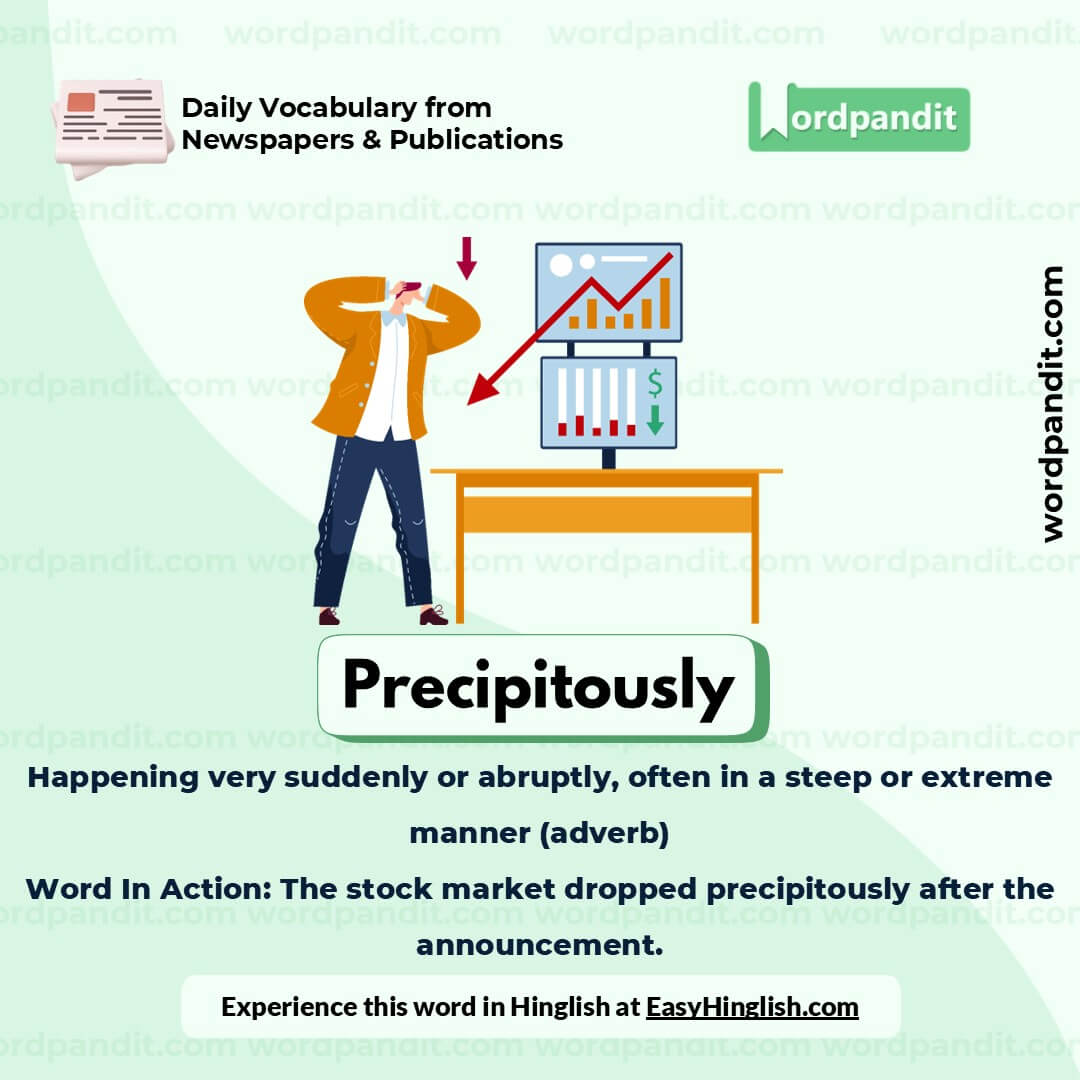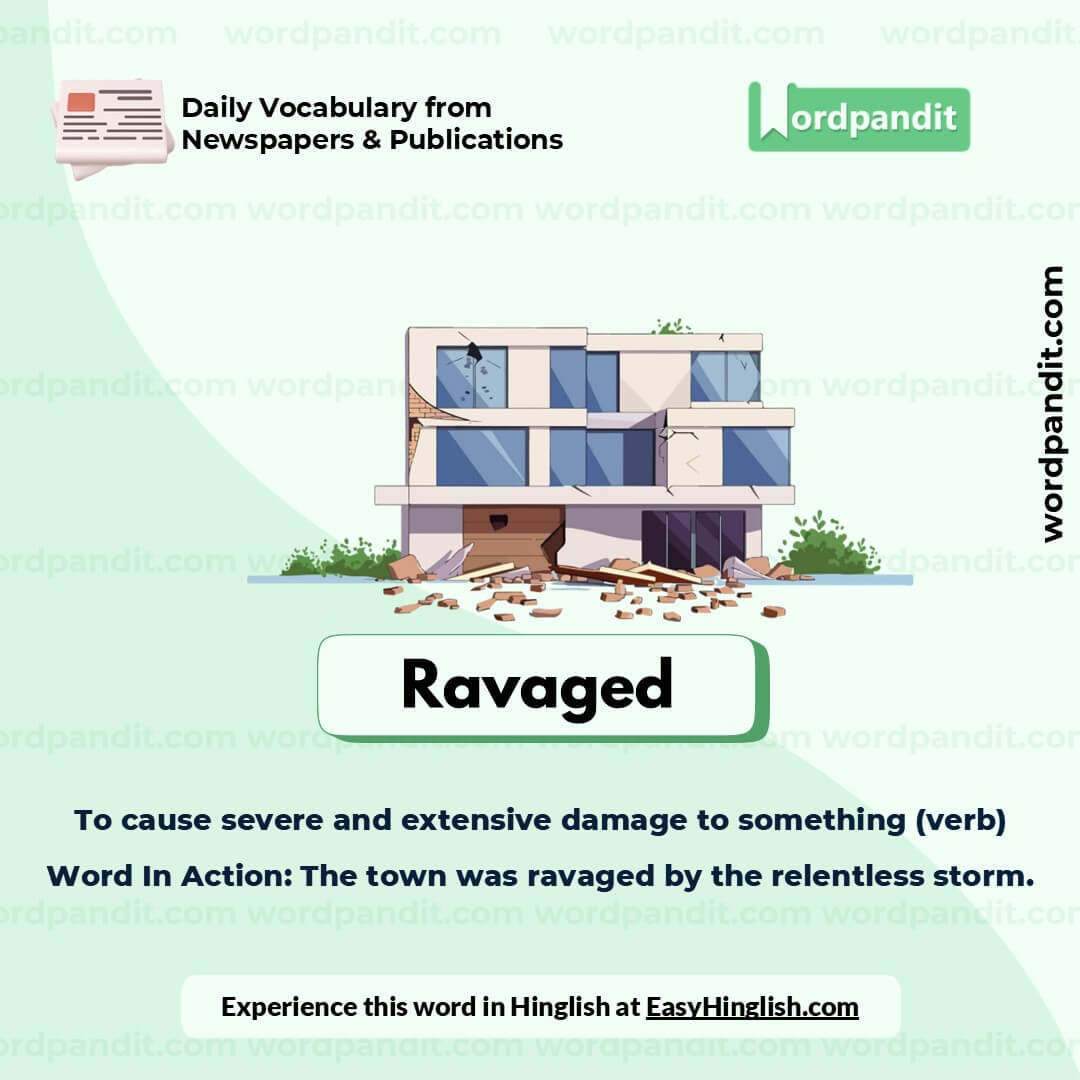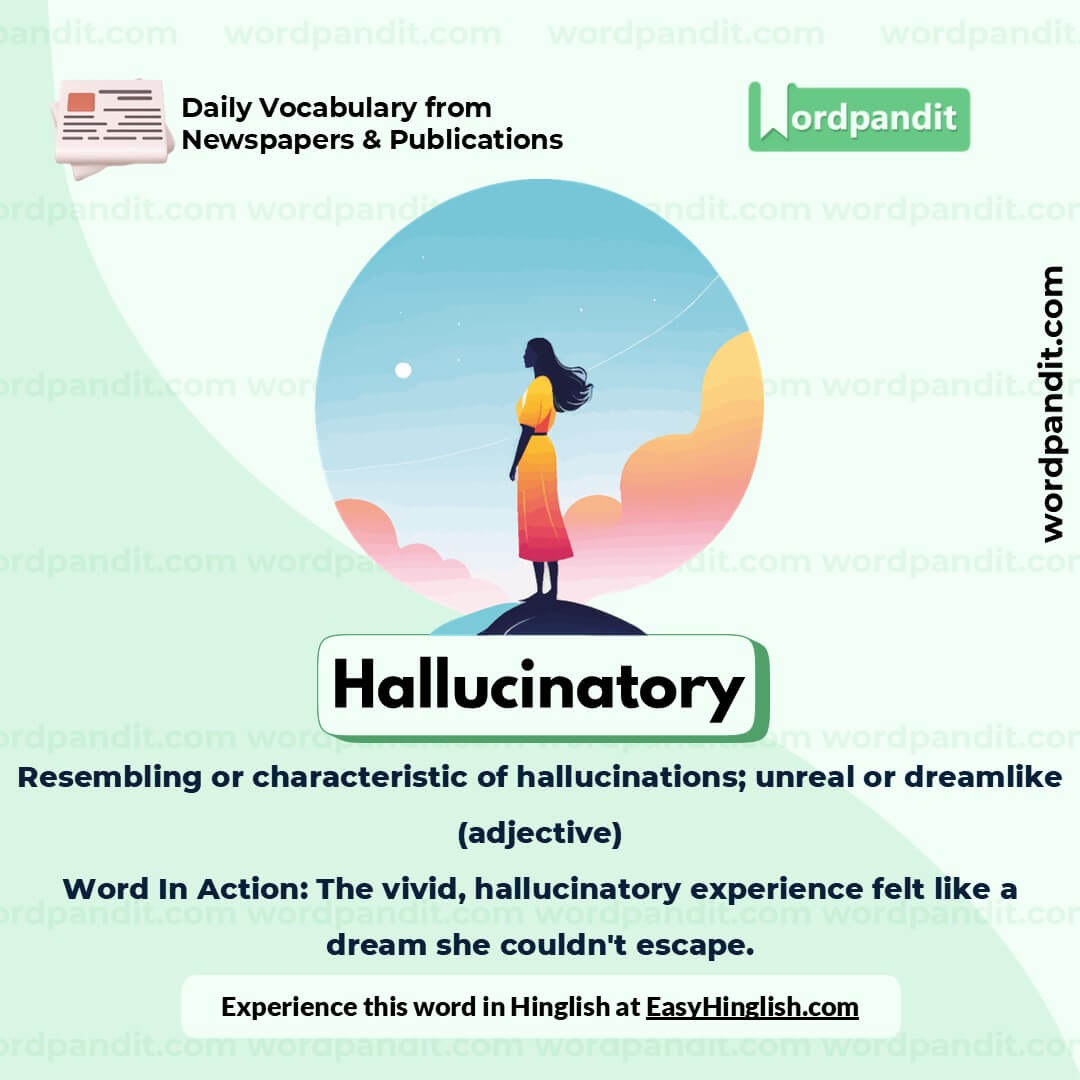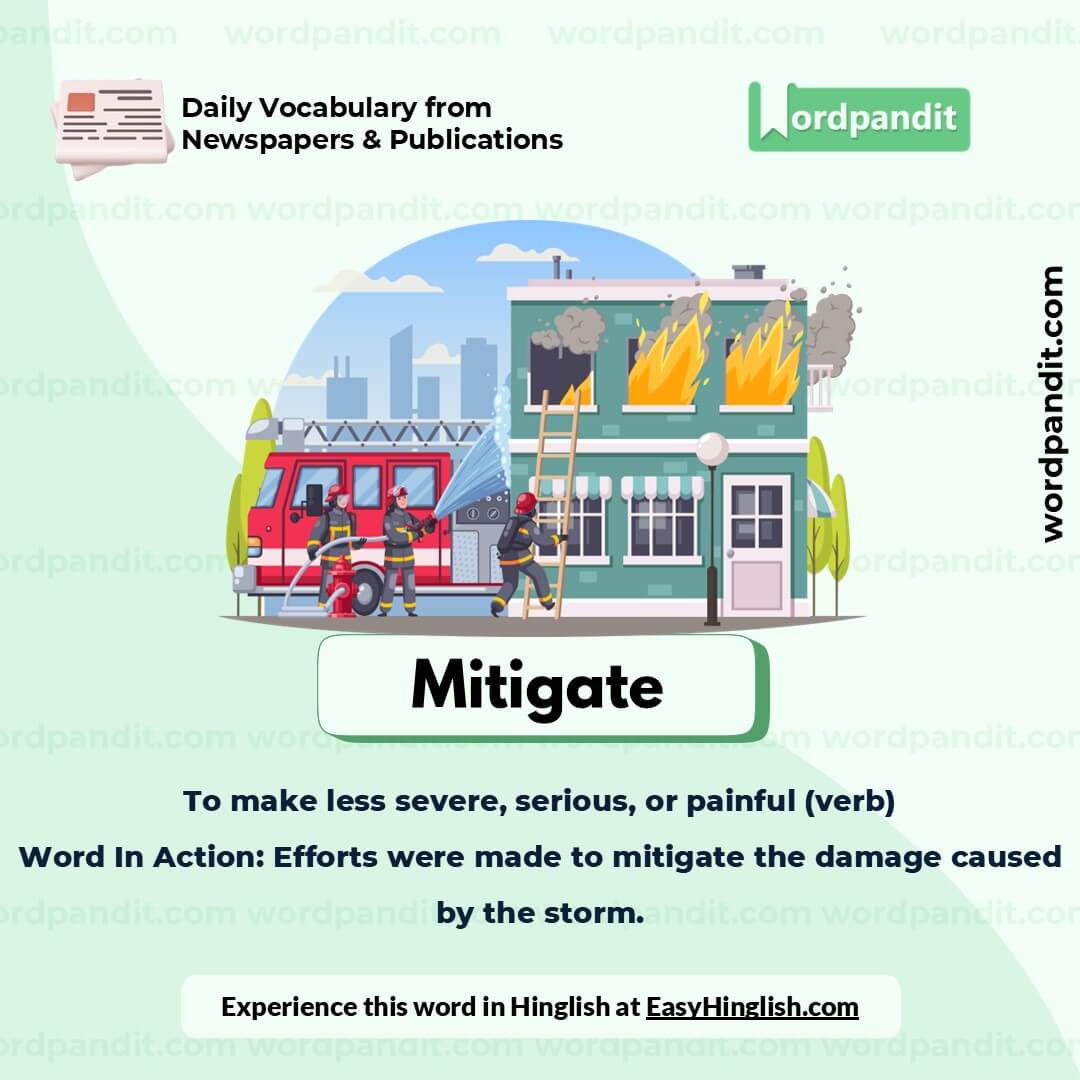Daily Vocabulary from International Newspapers and Publications
Expand Your Vocabulary with Wordpandit’s Global Vocabulary Hub
At Wordpandit, we are committed to helping you develop a truly global vocabulary by drawing from some of the most respected international publications. This section is designed to keep you ahead of the curve by introducing you to words that define global conversations and trends.
The Power of Global Sources
To help you think and communicate on a global scale, we curate vocabulary from renowned international sources, such as:
- The New York Times
- The Washington Post
- BBC
- The Guardian
- The Economist
- Scientific American
- Psychology Today
- And many more...
Stay Global, Stay Competitive
Our daily updates from international publications ensure you are consistently exposed to new words that reflect global news and developments, making sure your vocabulary is not only current but also globally relevant.
Enhance Your Global Perspective
Whether you’re preparing for international exams, aiming to excel in global business communication, or want to enhance your language skills for personal growth, Wordpandit offers the resources you need to thrive in a global context.
Effective Learning, Global Reach
Our learning methodology combines global examples, memory aids, and interactive activities, allowing you to internalize new words effectively and apply them in real-world scenarios.
Begin Your Global Vocabulary Journey Now!
Why Choose Wordpandit?
Practical Learning: Focus on words you'll actually encounter in real-world reading, enhancing your comprehension and communication skills.
Diverse Content: From current affairs to scientific breakthroughs, our varied sources expose you to vocabulary across multiple domains.
Effortless Integration: Make Wordpandit a part of your daily routine. Just a few minutes each day can significantly boost your lexicon over time.
Your Path to Vocabulary Mastery
- Visit our Daily Vocabulary section regularly
- Explore new words and their usage in context
- Practice incorporating these words into your own writing and speech
- Track your progress as your vocabulary expands
Start Your Journey Today
Embark on your vocabulary enhancement journey with Wordpandit. By consistently engaging with our daily posts, you'll build a robust vocabulary that serves you well in academic, professional, and personal contexts.
Remember, a word a day keeps linguistic limitations at bay. Make Wordpandit your daily companion in the quest for vocabulary excellence!
WORD-1: Precipitously
Context:
"lung cancer promptly peaked and then dropped precipitously" - The Washington Post
Explanatory Paragraph:
When something happens precipitously, it occurs very suddenly and steeply, often with significant speed and impact. This word is often used to describe events or changes that are abrupt and dramatic, such as a rapid decrease in numbers or a sudden decline in conditions.
Meaning: Happening very suddenly or abruptly, often in a steep or extreme manner (adverb)
Pronunciation: prih-SIP-uh-tus-lee
Difficulty Level: ⭐⭐⭐ (Advanced)
Etymology: From the Latin praecipitare meaning "to cast down or hurl"
Synonyms & Antonyms:
Synonyms: abruptly, steeply, sharply, suddenly
Antonyms: gradually, slowly, steadily
Usage Examples:
- The stock prices fell precipitously after the unexpected market crash.
- Her health declined precipitously, worrying her family and friends.
- The mountain path dropped precipitously, making the hike treacherous.
- The company's profits rose precipitously following the launch of their new product.
Cultural Reference:
In economic contexts, "precipitous" is commonly used to describe sudden, steep declines, such as a "precipitous drop" in stock prices or employment rates, reflecting rapid and often disruptive change.
Think About It:
What are some real-world events that have occurred precipitously in recent history, and what were their impacts?
Quick Activity:
Think of an example where something happened suddenly in your life. Write a sentence using "precipitously" to describe it.
Memory Tip:
Remember "precipitously" by associating it with "precipice" — just like a cliff drops steeply, so does something that happens precipitously.
Real-World Application:
In discussions about changes in health, finance, or environmental conditions, "precipitously" effectively conveys rapid or steep declines or increases, adding urgency and emphasis.
WORD-2: Ravaged
Context:
"Hurricane Helene ravaged southern Appalachia with unprecedented floods." - The Washington Post
Explanatory Paragraph:
The word ravaged is used to describe severe destruction or damage, often in the context of natural disasters or violent events. When something is ravaged, it is left in ruins, showing the impact of powerful and devastating forces.
Meaning: To cause severe and extensive damage to something (verb)
Pronunciation: RAV-ijd
Difficulty Level: ⭐⭐ (Intermediate)
Etymology: From French ravager, which means "to lay waste" or "destroy"
Synonyms & Antonyms:
Synonyms: devastate, destroy, wreck, demolish
Antonyms: restore, repair, heal, rebuild
Usage Examples:
- The wildfire ravaged thousands of acres of forest, leaving a barren landscape behind.
- The invading army ravaged the coastal towns, leaving them in ruins.
- Years of neglect had ravaged the historic building, making it unsafe to enter.
- The hurricane ravaged the small island, displacing its residents and destroying homes.
Cultural Reference:
The term "ravaged" is often used in news reports to describe the aftermath of natural disasters, conveying the level of destruction and its impact on communities.
Think About It:
How can communities recover after being ravaged by a natural disaster, and what role does outside assistance play in the rebuilding process?
Quick Activity:
Think of an event that caused severe damage or destruction. Write a sentence using "ravaged" to describe the scene.
Memory Tip:
Link "ravaged" to "rage" — imagine a furious force that leaves destruction in its wake, helping to remember its meaning.
Real-World Application:
In environmental studies, "ravaged" is frequently used to describe the impact of climate change on ecosystems, highlighting urgent needs for sustainable solutions.
WORD-3: Clamoring
Context:
"you might think those officials would be clamoring for urgent action." - The Washington Post
Explanatory Paragraph:
The word clamoring describes a loud or intense demand, usually from a group expressing a strong need or desire for something. It often conveys urgency and a collective push for attention, making it clear that there is widespread support or concern for the issue at hand.
Meaning: To make a loud and insistent demand or protest (verb)
Pronunciation: KLAM-er-ing
Difficulty Level: ⭐⭐ (Intermediate)
Etymology: From Latin clamare meaning "to cry out"
Synonyms & Antonyms:
Synonyms: shouting, protesting, demanding, urging
Antonyms: silence, peace, calm, quiet
Usage Examples:
- The public was clamoring for more transparency from the government.
- Fans were clamoring to get a glimpse of the superstar after the concert.
- The workers were clamoring for fair wages and better working conditions.
- With the project behind schedule, the team was clamoring for additional resources.
Cultural Reference:
"Clamoring for Change" is a phrase often used in media to describe public demands for reforms in areas like policy, social justice, or environmental protection.
Think About It:
What kinds of situations cause people to start clamoring for change, and what makes such demands effective?
Quick Activity:
Think of a cause or issue you feel strongly about. Write a sentence using "clamoring" to describe how people advocate for it.
Memory Tip:
Remember "clamoring" by thinking of "clamor" as a loud noise or "call" that groups make when they want something urgently.
Real-World Application:
"Clamoring" is frequently used in journalism and discussions on public opinion to describe collective demands for government action, change, or social justice.
WORD-4: Hallucinatory
Context:
"Not all MAGA-cult Republicans are as clueless as Rep. Marjorie Taylor Greene... who offered a hallucinatory conspiracy theory." - The Washington Post
Explanatory Paragraph:
The term hallucinatory refers to something that feels unreal, dreamlike, or detached from reality, often resembling hallucinations. It describes ideas, visions, or theories that are so far-fetched or bizarre that they seem like something out of a dream or fantasy rather than reality.
Meaning: Resembling or characteristic of hallucinations; unreal or dreamlike (adjective)
Pronunciation: huh-LOO-sin-uh-tor-ee
Difficulty Level: ⭐⭐⭐ (Advanced)
Etymology: From Latin hallucinari meaning "to wander in mind" or "to dream"
Synonyms & Antonyms:
Synonyms: unreal, surreal, imaginary, dreamlike, delusional
Antonyms: realistic, factual, grounded, logical
Usage Examples:
- After hours of hiking in the desert, he started having hallucinatory visions of water.
- The movie's visuals had a hallucinatory quality, with scenes blending dreams and reality.
- Her theory seemed hallucinatory, disconnected from any real facts or evidence.
- The novel’s plot was filled with hallucinatory descriptions, making it feel like a surreal journey.
Cultural Reference:
In literature and film, a "hallucinatory" style is often used to create surreal, dreamlike experiences, as seen in movies like "Inception," which blurs the lines between reality and illusion.
Think About It:
How can something hallucinatory influence people’s perception of reality, especially in contexts like media or conspiracy theories?
Quick Activity:
Imagine a dreamlike scene that feels hallucinatory. Write a sentence describing it using the word "hallucinatory."
Memory Tip:
Connect "hallucinatory" with "hallucination" to remember it describes things that feel unreal or dreamlike.
Real-World Application:
"Hallucinatory" is often used to describe perceptions or theories in media and politics that are detached from reality, highlighting the word's relevance in analyzing misinformation or speculative ideas.
WORD-5: Mitigate
Context:
"Republican voters might be prepared to support policies to mitigate and adapt to climate change." - The Washington Post
Explanatory Paragraph:
The word mitigate means to make something less severe, harmful, or painful. When we take steps to mitigate a problem, we are trying to reduce its negative impact. This term is commonly used in discussions about strategies to address significant issues, like environmental challenges, by lessening their harmful effects.
Meaning: To make less severe, serious, or painful (verb)
Pronunciation: MIT-ih-gayt
Difficulty Level: ⭐⭐ (Intermediate)
Etymology: From Latin mitigare meaning "to soften" or "alleviate"
Synonyms & Antonyms:
Synonyms: alleviate, reduce, lessen, ease, diminish
Antonyms: aggravate, intensify, worsen, exacerbate
Usage Examples:
- Governments around the world are working on strategies to mitigate the effects of climate change.
- She took medication to mitigate the pain from her injury.
- The company implemented new policies to mitigate the risk of data breaches.
- Reforestation can help mitigate environmental damage caused by deforestation.
Cultural Reference:
Mitigation is a key term in disaster management and environmental policies, where it refers to actions aimed at reducing the severity of risks or damages, such as flood control measures and carbon reduction plans.
Think About It:
What are some ways individuals or communities can take action to mitigate the effects of environmental issues they face?
Quick Activity:
Think of a challenging situation in your life. Write a sentence describing how you could mitigate its impact using the word "mitigate."
Memory Tip:
Think of "mitigate" as "make it great" — to make a situation better by reducing its severity.
Real-World Application:
Mitigation strategies are essential in fields like healthcare, finance, and environmental science, where controlling risks and reducing negative impacts is crucial to protecting health, wealth, and natural resources.


















